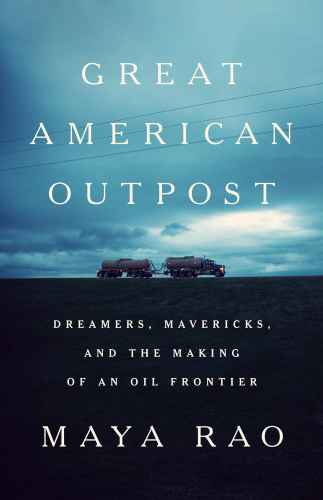
Great American Outpost
Dreamers, Mavericks, and the Making of an Oil Frontier
- اطلاعات
- نقد و بررسی
- دیدگاه کاربران
نقد و بررسی

February 15, 2018
Newspaper journalist Rao travels to remote western North Dakota to immerse herself in the boom-and-bust cycle of shale oil extraction.For more than a decade, the dangers of fracking--drilling deep into the Earth to extract shale oil using massive amounts of water and chemicals--have been widely reported: environmental degradation, earthquakes, outsized profits for the oil industry, lost savings for individuals scammed by get-rich-quick schemes, negatively transformed local economies, and deaths of itinerant oil field workers as well as local residents. Portions of Oklahoma, Texas, and Pennsylvania have received huge amounts of attention during the debates about fracking, but North Dakota, one of the most remote, frigid, and least populous of the 50 states, has been affected more heavily than any other. To understand the real situation among competing claims, Rao arrived from out of state, established a working relationship with a truck driver trying to earn a better living than he could in North Carolina, developed numerous other sources, lived in costly but substandard housing, existed on low-quality food, and placed herself in physical danger almost every day, emerging with an eye-opening, occasionally scattershot, "on-the-ground account of capitalism, industrialization, and rugged individualism" as well as "the power and failings of free enterprise." At some level, almost everybody involved in the business understood that the boom economy would collapse eventually, but the author found few who predicted that the bust would arrive in less than a decade. As a result, local businesses went broke, temporary environmental scarring became permanent, and western North Dakota became less desirable than ever as a place to settle, especially given the harsh weather and downturn in agriculture. Rao occasionally injects herself into the story, but the truck driver who freely shared his adventures rightly dominates the book.A superbly reported book marred only by an occasionally wandering narrative.
COPYRIGHT(2018) Kirkus Reviews, ALL RIGHTS RESERVED.

March 5, 2018
Minneapolis Star-Tribune journalist Rao’s debut paints a vivid picture of the rapid development that accompanied the recent oil boom in North Dakota. For seven years beginning in 2012, Rao immersed herself in the Bakken oil boomtown, which she likens to a 21st-century gold rush as “hordes of people flock to this untrammeled terrain to make their fortune.” Her portrait focuses largely on the lives of the people she encountered there: the “pioneers, outcasts... dreamers, do-gooders, failures, drifters, deadbeats” who were drawn to the site from all around the country for its promise of economic prosperity. Rao introduces readers to Danny Witt, a surfer from North Carolina who trucked water and crude along desolate highways to and from the oil fields. She writes of the monotony of his task—much of it “was stop and go, idling and stalling”—and the peculiar rhythms of time spent largely on the road. She also follows Marcus Jundt, a restaurateur who financed four restaurants in town, including the Williston Brewing Company, to serve newcomers and offer respite for the laborers working at the Bakken rigs. Rao poignantly captures the change in atmosphere as the boom turns to bust and local businesses built on the thriving oil community start to go broke. This is a memorable account of the Bakken boom and all that it entailed.

April 1, 2018
This first book by reporter Rao (Minneapolis Star Tribune) offers an eye-opening account of the North Dakota oil boom and its effects on the state, citizens, and those working the Bakken oil fields. Rao spent 2015 and 2016 conducting interviews and immersing herself in the oil culture, and here explains that while North Dakota's frigid temperature used to keep people away, the oil rush attracted individuals to the area from across the country. This created more jobs than available housing and caused many workers--including a mix of dangerous, untrustworthy, and honest characters--to seek shelter in tents and vehicles. While earning some of the highest salaries in the country, many individuals did little to help the state's economy as they came and went, destroying roads with trucks and equipment in the process. As some people were increasing their financial gains, prices plummeted and drilling became less profitable, which led to mass layoffs and struggling businesses. Rao further touches on the Trump administration's part to alter U.S. oil production with the approval of the Dakota Access Pipeline. VERDICT These intriguing real-life accounts will engage readers of history and current affairs. Highly recommended.--David Miller, Farmville P.L., NC
Copyright 2018 Library Journal, LLC Used with permission.




دیدگاه کاربران